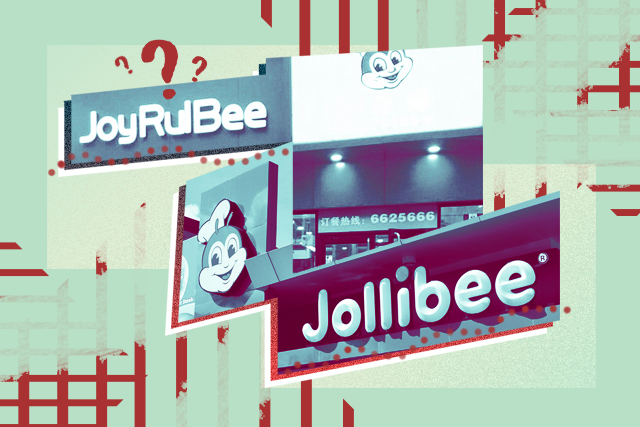
A local fast food giant is now moving to further protect and uphold its trademark rights when pictures and a video of a fast food joint bearing a similar name, logo and some menu items were spotted in Guangxi, China.
Jollibee Foods Corp. announced in a statement that they are aware JoyRulBee, a Chinese fast food joint, is infringing on its trademark rights under Republic Act 8293 or the “Intellectual Property Code of the Philippines.”
Pictures and a video featuring JoyRulBee made the rounds on social media, where Filipinos immediately noticed glaring similarities with the well-beloved local fast food joint.
A Filipino overseas worker initially shared the photos and noted that it was the first time he has seen such a store in his 10-year stay in China.
He also uploaded a video that accompanied his post and exclaimed, “Ito ang matindi! Pati Jollibee kinopya! Joyrulbee, dito lang sa China ‘yan.”
Food reportedly offered by JoyRulBee includes burgers, fries, chicken and sundaes—known staples of the Filipino fast food joint.
Jollibee noted that they were already aware of the infringement and said in a statement:
“The particular JoyRulBee infringing store in Guangxi, China has already been brought to the attention of Jollibee Foods Corporation even before the post went viral in social media.”
“Our Legal team has been taking the necessary steps in order to protect and uphold our company’s trademark rights as what is provided for under the law.”
The exact date when JoyRulBee has been established is unknown, as well as the name or identity of its owners.
A look at the country’s trademark law
A company can register for trademark rights under the Intellectual Property Office of the Philippines (IPOPHIL) to avoid other entities from imitating their goods and services and in turn, make them exclusive to themselves.
A trademark is defined as “a tool used that differentiates goods and services from each other.”

It can be in the form of a word, group of words, sign, symbol, logo or a combination of the ones mentioned.
Trademark rights are protected under the “Intellectual Property Code of the Philippines.”
If another entity makes, sells or imports a patented product without being authorized by the owner, the former can be sued for infringement.
This is stated in Section 155 of RA 8293, where the following acts are considered infringement: Reproduction, counterfeiting or creation of a colorable imitation of a registered mark or an entity’s dominant feature that is intended for commercial use.
Violators of the provision shall be ordered to destroy their goods and pay the registered entity with the profit that they have made from selling the goods.
Damages will be doubled if the intention of the counterfeit was to deceive the public or defraud the registered entity.
The counterfeiter will serve jail time of two to five years and pay a penalty fee of P50,000 to P200,000. — Artwork by Uela Badayos; Photo from Christopher Guzman via Facebook









